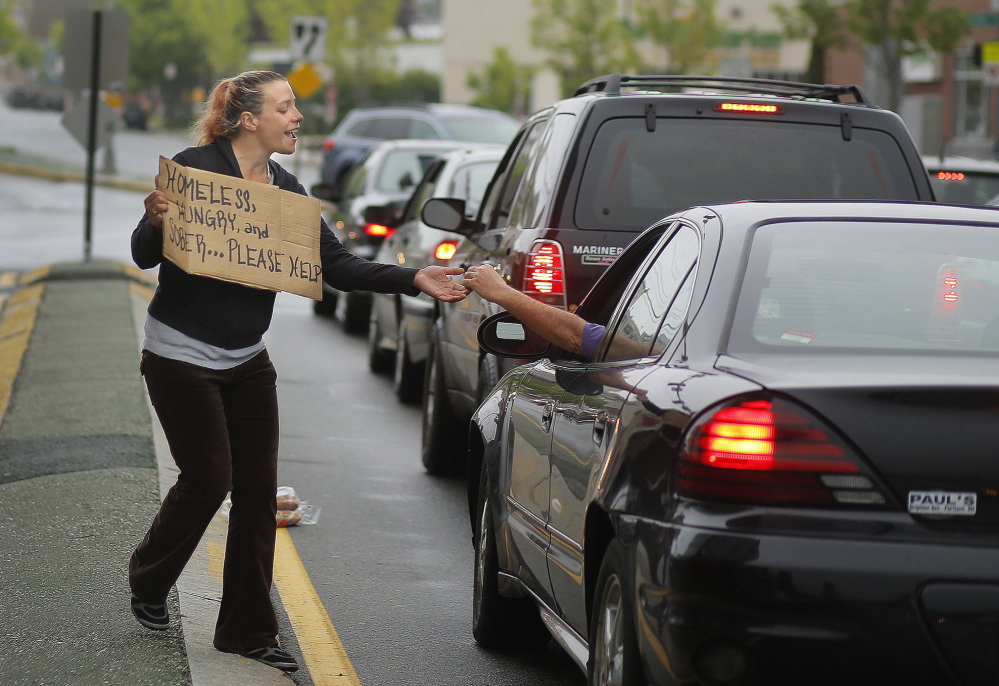The city of Portland is appealing a federal court ruling against its ban on panhandling and other activity in street medians.
Last summer, with an increased number of people holding signs asking for money, the City Council banned people from standing in street medians unless they were crossing the street. The ordinance, which took effect in August, was challenged by two political activists and a panhandler, who were represented by the American Civil Liberties Union of Maine and the Boston-based law firm Goodwin Procter.
While the city argued the ban was a matter of public safety, the plaintiffs argued that it interfered with their rights to free speech.
In February, U.S. District Judge George Singal ruled the ordinance was unconstitutional because it does not apply to people who stand on medians to post campaign signs.
The city initially had until March 14 to appeal the ruling, but was granted a one-month extension to see how the 1st U.S. Circuit Court of Appeals in Boston rules in a pending dispute over a similar ordinance in Worcester, Mass.
Trish McAllister, the city attorney arguing the case in Portland, said she will ask the appeals court to delay setting a schedule for Portland’s appeal until it reaches a decision in the Worcester case.
“That (Worcester) decision will be really critical in whether we appeal or not,” McAllister said. “It’s so similar. (The ordinance is) not about soliciting in the median; it’s about standing and staying in the median.”
Zachary Heiden, the legal director of the ACLU of Maine, downplayed the impact of the Worcester case.
Judge Singal specifically addressed in his ruling the difference between the Portland and Worcester ordinances. Portland’s ordinance was not content-neutral because it didn’t apply to political campaign signs, whereas Worcester’s ordinance applied to anyone, he said.
“This case is about core First Amendment protections. The District Court correctly found the city overstepped its authority,” Heiden said. “We believe the District Court got it right and the Court of Appeals will get it right.”
Even if the city’s ordinance doesn’t survive in court, Portland isn’t backing down from removing people from medians, McAllister said.
When the City Council first considered, and ultimately rejected, its ordinance in 2012, many residents and businesses complained about an increase in panhandlers. That prompted the council to reconsider the ordinance in 2013.
City officials are concerned now about another potential rise in panhandling this summer in light of the U.S. District Court ruling.
McAllister said the council will likely look for other ways to keep people off the medians, including changing the disputed ordinance to include the placement of campaign signs.
“I’m very certain the council is going to discuss other options to address what we see as a public safety issue,” she said. “There are so many options.”
Heiden said the ACLU of Maine has long contended that there are other options for addressing legitimate public safety issues that do not infringe upon First Amendment rights.
The battle over the ordinance thrust Portland into a legal debate over free-speech rights that is spreading around the country as a growing number of communities restrict when and where people can ask for money.
Lewiston and Biddeford have considered restricting aggressive panhandling. Biddeford officials were moving forward with a ban on the use of street medians to ask for money until the lawsuit in Portland led them to put the measure on hold.
In 2012, a federal judge struck down a Michigan law banning begging in public places, saying it violated First Amendment protections for free speech.
Randy Billings can be contacted at 791-6346 or at:rbillings@pressherald.comTwitter: @randybillings
Send questions/comments to the editors.




Success. Please wait for the page to reload. If the page does not reload within 5 seconds, please refresh the page.
Enter your email and password to access comments.
Hi, to comment on stories you must . This profile is in addition to your subscription and website login.
Already have a commenting profile? .
Invalid username/password.
Please check your email to confirm and complete your registration.
Only subscribers are eligible to post comments. Please subscribe or login first for digital access. Here’s why.
Use the form below to reset your password. When you've submitted your account email, we will send an email with a reset code.